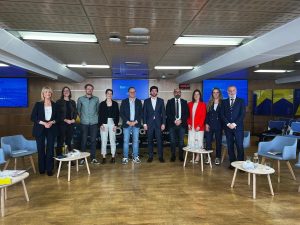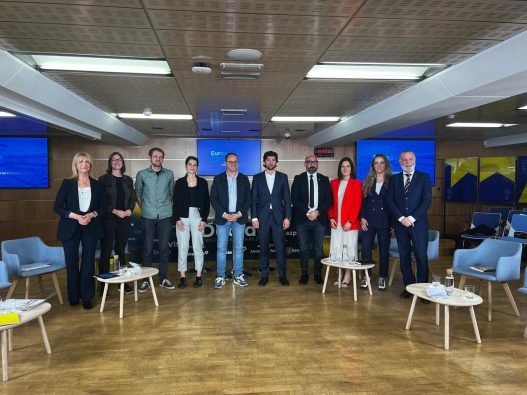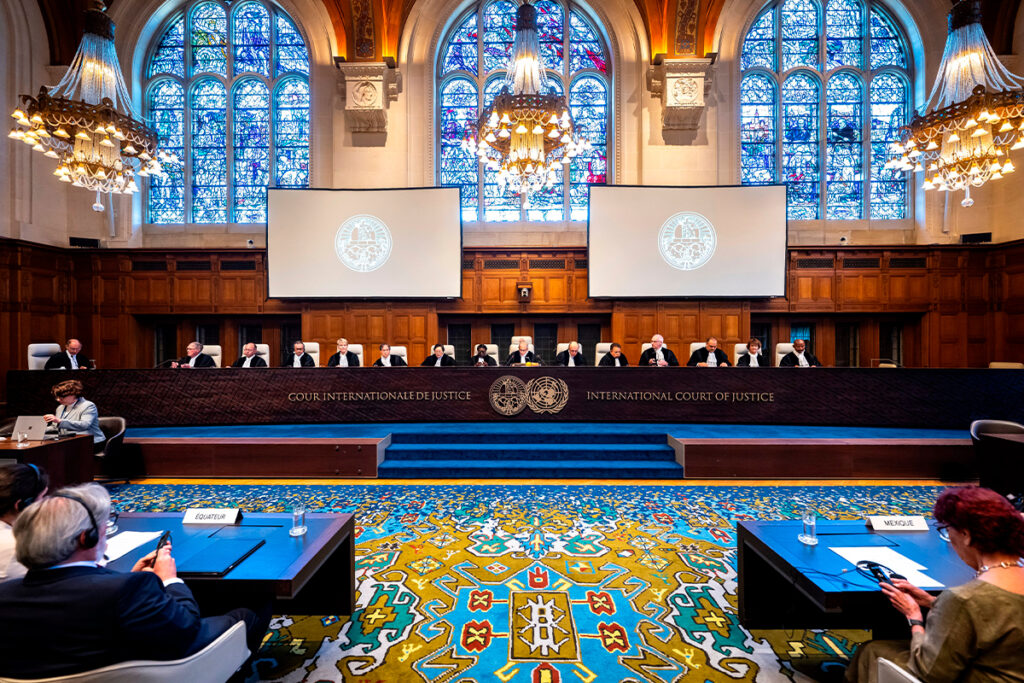
ELECTORAL DEBATE OF CANAL EUROPA AND THE EUROPEAN JOURNALISTS ASSOCIATION
By María Núñez De Arenas / Aquí Europa
On June 9, Spaniards are called to vote in the elections to the European Parliament. These elections take place in a geopolitical context of enormous uncertainty and with a European agenda full of challenges. In this situation, it is of enormous importance to inform citizens of the different projects that each political party offers to build a better Europe.
The Europa Room of the European Parliament Headquarters in Madrid has been the scene of a debate between the eight main political parties running in the European Elections. A meeting that has been an opportunity to discuss the main European issues from a journalistic point of view.
The debate was moderated by the director of Aquí Europa and Canal Europa, Jesús González Mateos and by Encarna Samitier, director of 20 minutos and counted with the participation of Cesar Luena (PSOE), Adrián Vázquez (PP), Jordi Cañas (Ciudadanos), Floren Marcellesi (Sumar), Isa Serra (Podemos), Marcela Reigía (Vox), Helle Kettner (Esquerra Republicana) and Oihane Agirregoitia (PNV).
The eight participants addressed the European reality through four blocks: “Europe in the world, security and defense”, “Democracy, rights and values”, “Sustainability and industrial competitiveness” and “What is at stake in the European elections”. The journalistic nature of the debate also left its mark on the audience, which was made up of information professionals from different media.
EUROPE IN THE WORLD, SECURITY AND DEFENSE
In an international context marked by armed conflicts, European defense and security has become a central part of the EU agenda. The next European legislature will be fundamental to confront the position of the EU in the face of external tension and its strategy for the defense of peace.
In this area, Cesar Luena, of the PSOE, assured that the EU “must have a stronger and more forceful voice” in the face of the Israel-Hamas conflict and that “the hard line of sanctions against Russia must be maintained”. Luena approved “increasing our strategic and military capabilities, but never withdrawing funds that are to preserve social Europe”.
From Ciudadanos, Jordi Cañas assured that “without security there is no freedom” and that the EU “must guarantee peace and freedom in a world where threats have returned and where global powers are being rearranged”. Regarding investment in defense, Cañas assured that “if we are not autonomous, we will not be able to grow and assume our role”.
Marcela Reigía was the spokesperson for Vox in this debate and assured that “Europe suffers a bigger threat” and “it is illegal immigration”, for which her party proposes “strong borders, expulsion of illegals and the end of goodism”.
Isa Serra spoke on behalf of Podemos, who claim to defend a “Europe of peace” and “diplomatic channels to end the war in Ukraine”. She also stated that “it is evident that we are living a genocide in Palestine” and criticized Spain because she considers that “recognizing the Palestinian state is not enough”.
Floren Marcellesi, from Sumar, assured that “Europe must defend Human Rights and International Law and this must be seen in all conflicts”. Therefore, he assured that “we cannot say different things in conflicts and we cannot go against the CJEU”.
Helle Kettner, from Esquerra Republicana, said that they “miss the diplomatic work to reach points of resolution in conflicts” and that “we should talk about European strategic sovereignty to be self-sufficient in many areas”.
From the PNV, Oihane Agirregoitia, said that “the EU must know how to guarantee peace and protection” and, to this end, “it must strengthen the capacities of border territories, guarantee corridors with food security and improve digital resilience”.
This block was closed by Adrián Vázquez, from the PP, who stated that “obviously we all want peace, but it must be defended”. For this reason, he proposed “developing a coordinated defense industry and the creation of a Defense Committee with a legislative character”.
DEMOCRACY, RIGHTS AND VALUES
The essence of the EU is democracy and the rule of law. In the current context, the moderators asked the participants about their proposal to preserve community values in the next legislature and their position on European migration policies.
Adrián Vázquez mentioned the conditionality mechanisms so that funds “do not go to those who do not respect the values of the EU”, adding that “unfortunately Spain is in that club”.
Jordi Cañas affirmed that the EU is “a guarantor of rights and democracy” and “it is essential that it is maintained”. Regarding migration, the representative of Ciudadanos assured that “we must work to channel migration”.
The representative of Vox assured that “democracies are in danger because of the oligarchs who make decisions above the European citizenship”. As an example, she spoke of Viktor Orbán, assuring that the Hungarian leader has been threatened and sanctioned for doing what he promised”.
Isa Serra continued with the opposition to the current European Commission and affirmed that “the policy of Von Der Leyen and the USA does not allow us to fight for Human Rights”. The participant appealed to the need to invest in social issues in the EU because “we are returning to the austerity path that generated a lot of poverty”.
Sumar was critical of the Pact on Asylum and Migration, which “externalizes borders, allows returns to unsafe countries, and puts a price on migrants: It is a pact of shame”.
From Esquerra Republicana they consider that “social rights must always take priority over economic priorities”, as well as that “we must not return to the mistakes of the past”, appealing to the fiscal policies of austerity. On the other hand, Oihane Agirregoitia, from the PNV, assured that it is necessary to make “an appeal to strengthen the social pillar as the essence of the European model and differentiating it from the USA and China” and highlighted the abstention of his party in the Migration and Asylum Pact.
César Luena spoke of the need to “impose a cordon sanitaire to the extreme right to defend the values of the EU” and assured that “the extreme right is a clear enemy of civilization and the EU”. Furthermore, on the migratory agreement he stated that “it is insufficient but it was the first step”.
SUSTAINABILITY AND INDUSTRIAL COMPETITIVENESS
Sustainability measures while keeping an eye on industry will be one of the keys in the coming years to achieve the European objectives of the Green Pact, but also to maintain the competitiveness of European markets.
In this sense, Cesar Luena assured that “only a sustainable economy will be a competitive economy” and that, in the work of the Green Pact, “there must be a law of adaptation that incorporates more funding for diversity in nature, for the health of soils and for water”. The PP representative showed his support for this last proposal of the PSOE, assuring to agree “in a European water pact, which is a problem of Spain, but also of Europe.”
Jordi Cañas stated that “environmental sustainability has to be linked to social sustainability and economic sustainability” because otherwise “the obligations of environmental perspective can have perverse effects on our industry and on our competitiveness.
From Vox, the participant assured that the responsibility “for climate change comes from East Asia”, so she positioned herself against “policies with which the same people always lose”. In contrast, Isa Serra appealed for “public control of strategic sectors for an ecological and public transition”.
From Sumar and Esquerra approached the approach of Podemos and shared the idea that “the transition must be fair or it will not be”. While Marcellesi appealed to “coherence in policies” to “respond to the objectives”, the representative of ER mentioned new types of taxes, “such as those proposed for private airplanes”.
The PNV participant stated that the transition must be made “without leaving anyone behind”, as well as addressing “what infrastructures we need to generate and store clean energy”.
WHAT IS AT STAKE IN THE EUROPEAN ELECTIONS?
The last block of the debate focused on the relevance of the upcoming European elections on June 9. In this sense, Adrián Vázquez assured that “they are not just another election” and that “we need Spanish members of parliament who believe in a democratic Spain”.
Jordi Cañas wanted to reduce the national key saying that “they are not about Feijoo or Sánchez”, but that “it is about how we are going to defend the rights of the Spaniards from a European perspective”. On the other hand, the representative of Vox spoke of the fact that “it is time to rebuild Europe” and that “the elite should stop leading the EU”.
The left-wing parties focused the importance of the elections on fighting against the growth of the extreme right, since, according to Luena, “we do not want them to have strength”. While Serra appealed to vote for parties “that defend Human Rights and peace”, the representative of Sumar affirmed “to defend LGTBIQ+ people, migrants and women against setbacks”. For its part, Esquerra Republicana assured that “the reactionary right wing puts fundamental rights at stake”.
The PNV brought its position closer to the parties of the political left and affirmed that “nothing should be taken for granted because we have extremist movements that are creating tension and hatred”.
A DEBATE UNDER THE WATCHFUL EYE OF JOURNALISTS
The journalistic key to this European debate was not only in the moderators, but also in the audience and in the closing of the meeting. Before the end, the eight participants answered three questions that the Association of European Journalists had prepared for the representatives, which were intended to address three issues of political and civil interest.
The APE asked about possible alliances after the European results, to which the PSOE representative responded with the need for “a cordon sanitaire to the ultra-right” and the PP participant put “the red line” in the parties that “have favored foreign interference”. The rest of the formations aligned themselves with the idea of an alliance in accordance with the values of the EU, while from Vox they assured “to denounce the current alliances”.
The journalists also asked the parties about their position on the election of the candidate for the European Commission, to which they all positioned themselves in favor of the Spitzenkandidat process and of moving towards more democratic processes in the election of the Community Executive.
The third question that closed the debate focused on the position of the parties regarding the future enlargement, to which there was also a consensus in favor of a possible enlargement, but with the fulfillment of requirements and criteria met by the Member States in their different accession processes.
————
This article was originally published in Aquí Europa, with whose authorization we reproduce it.



